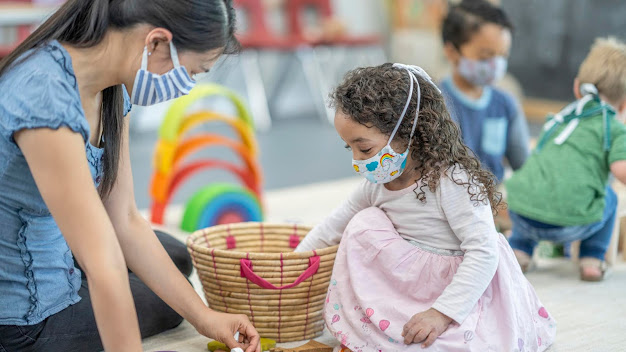Sharing Web Resources: Early Childhood Educators’ Wellbeing During the COVID-19 Pandemic & Colorado Creates Early Childhood EDU Dep.
The newsletter of interest from NIEER this week is titled “Early Childhood Educators’ Wellbeing During the COVID-19 Pandemic.” This survey was conducted during the COVID-19 pandemic in Australia through the Research Network of EC Professionals. The survey found that strong professional wellbeing was associated with both lower risk of staff turnover and less conflict in educator-child relationships.
Of the 232 early childhood educators surveyed, the majority were from a city in Australia called Victoria, where lockdowns were most severe. According to the researchers, educators indicated they could sustain strong relationships with children despite the negative impact they perceived the pandemic as having on their wellbeing. An analysis of the responses found educators’ wellbeing was relatively high, they noted.
“Supportive organizational structures and culture can assist EC [early childhood]educators in meeting the demands and expectations of their role, develop quality practice, ensure supportive working environments, and increase an EC educator’s intention to stay.”
This is important because EC educators’ wellbeing is essential for promoting quality educator-child relationships central to young children’s learning and development. The early childhood education and care (ECEC) profession faces challenging working conditions, leading to high work-related stress, emotional exhaustion, and staff turnover. The impact of the COVID-19 pandemic created conditions has exacerbated these challenges.
There are significant lessons to be learned from COVID-19 regarding the resilience of the workforce, the visibility (or not) of the vital work of EC educators, the value society places on the work, the level of government investment in supporting EC educators in the sector and the role that wellbeing plays in this. These lessons are vital to ensuring EC educators, in turn, can be supported and acknowledged for the critical role they play in advancing young children’s social, emotional, and cognitive learning, wellbeing, and development.
The news section of NIEER talks about the bill passed by the house in Colorado called HB21-1304. The bill was sponsored by Speaker Alec Garnett and Representative Emily Sirota and passed by 44-20.
The bill creates a new, cabinet-level state agency focused on early childhood education and care, setting up the framework for universal pre-K in Colorado. Based on the recommendations of the Early Childhood Leadership Commission, HB21-1304 creates the Department of Early Childhood as a new, cabinet-level state agency. Its mission is to expand access to high-quality, voluntary, affordable early childhood opportunities, support parents in accessing programs and services, promote equitable delivery of resources, and unify the fragmented administration of early childhood services to reduce duplicative oversight and administrative burden on families, providers, and educators.
In line with our study this week, the politicians are trying to support positive social change. Politicians are beginning to realize through science the benefits of investing in early childhood education. As Rep. Emily Sirota, D-Denver, said, “We know that early childhood years are the most crucial in a child’s cognitive development, but this time in a family’s life is often when they have the least support.” She went further to say that “child care and early childhood education are getting more expensive and harder to access for the families that need it. By creating a state department for early childhood education, we will lay the groundwork for universal pre-K and ensure that early childhood providers have the resources and funding necessary to ensure our youngest Coloradans succeed.”
Early care and education is a necessary component of the U.S. economic infrastructure. Following periods of paid leave and preceding preschool, families face gaps in affordable, high-quality, and stable early care and education arrangements that match their working hours. Expanding early care and education options can narrow pervasive social and economic inequalities and lead to more remarkable U.S. economic growth. The infusion of funds into early childhood education and the creation of universal pre-K will help address the inequitable distribution of resources and provide the investment needed to help ease the cost burden for families and ensure that a trained, stable workforce has adequate compensation.
Link to NIEER articles
Eadie, P., Levickis, P., Murray, L., Page, J., Elek, C.,& Church, A. (2021). Early Childhood Educators’ Wellbeing During the COVID-19 Pandemic. Retrieved from https://link.springer.com/article/10.1007%2Fs10643-021-01203-3
House Passes Bill to Create Early Childhood EDU Department. Retrieved from https://www.westernslopenow.com/colorado-news/house-passes-bill-to-create-early-childhood-edu-department/




I also noticed how many of the topics discussed on my site surrounded Covid-19. You made great points about the importance of early childhood and connected to our learning this week extremely well. This was my first time visiting your blog, I look forward to reading more posts from you :)
ReplyDelete-Rebecca Hurth
rebecca.hurth@waldenu.edu
Thank you Rebecca for reading my post! Looking forward to reading yours too.
Delete